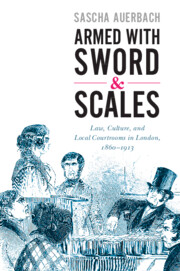Book contents
- Armed with Swords & Scales
- Studies in Legal History
- Armed with Swords & Scales
- Copyright page
- Dedication
- Epigraph
- Contents
- Figures
- Acknowledgments
- Glossary of Terms and Abbreviations
- Introduction
- 1 “Many-Coloured Scenes of Life”
- 2 “A Ruffian Rightly Punished”
- 3 “An Evil Quarter of an Hour about the Precincts”
- 4 “Two Shillings’ Worth of Revenge in the Form of a Summons”
- 5 A Poor Woman’s Court of Justice, 1882–1910
- 6 “The Very Centre of Observation and Information”
- Conclusion
- Bibliography
- Printed Primary Sources
- Secondary Sources
- Index
6 - “The Very Centre of Observation and Information”
Constables, Magistrates, and Changing Patterns of Prosecution and Punishment, 1880–1913
Published online by Cambridge University Press: 05 February 2021
- Armed with Swords & Scales
- Studies in Legal History
- Armed with Swords & Scales
- Copyright page
- Dedication
- Epigraph
- Contents
- Figures
- Acknowledgments
- Glossary of Terms and Abbreviations
- Introduction
- 1 “Many-Coloured Scenes of Life”
- 2 “A Ruffian Rightly Punished”
- 3 “An Evil Quarter of an Hour about the Precincts”
- 4 “Two Shillings’ Worth of Revenge in the Form of a Summons”
- 5 A Poor Woman’s Court of Justice, 1882–1910
- 6 “The Very Centre of Observation and Information”
- Conclusion
- Bibliography
- Printed Primary Sources
- Secondary Sources
- Index
Summary
In the decades prior to the First World War, the relationship between policing, adjudication, and punishment was continually being redefined not only for those who were its targets, but for its wielders as well. Police authority in the courtroom, though strengthened by expertise and training, was hardly uncontested. Magistrates and police constables were under constant public supervision, and the former were keen to avoid the widespread hostility expressed towards the latter in working-class communities. Regardless of the increasing intrusion of policing into everyday life, it lay in a magistrate’s hands to decide if any given defendant deserved leniency or severity and which laws merited rigorous enforcement. Magistrates and journalists challenged the reputation of constables, while defendants opted for summary jurisdiction of indictable offenses or guilty pleas to mediate the consequences of arrest and prosecution. Through these and other practices, local courtrooms proved crucial in reshaping the legal and social consequences of police prosecutions in this period. The concluding portion of this chapter briefly analyses the social composition of the London magistracy and how they grounded their claims to moral authority in the courtroom.
Keywords
- Type
- Chapter
- Information
- Armed with Sword and ScalesLaw, Culture, and Local Courtrooms in London, 1860–1913, pp. 281 - 340Publisher: Cambridge University PressPrint publication year: 2021

